We are over the moon to have won not one, not two, not even three, but SIX stars at the 2017 Great Taste Awards for our Farrington’s Mellow Yellow products this year. The judges have awarded a 1 star Great Taste award to each of our Classic Vinaigrette, Honey & Mustard Dressing, Balsamic Vinegar Dressing, Chilli Oil, Mayonnaise and Garlic Mayonnaise. For most products, this is their second, or even third Great Taste award but for our Chilli Oil, this is the first time it has been awarded a Great Taste star and we couldn’t be happier!
The Great Taste awards are the world’s largest and most trusted food and drink awards, with a panel of over 500 experts judging each product, being described as the ‘Oscars of the food world’. This year, 12,366 food and drink products entered into these prestigious awards, with only the very best products being awarded the coveted stars.
Here’s what the judges had to say about our products:
Chilli Oil: A wonderful colour and clarity. The nuttiness of the oil is retained and a subtle hint of chilli makes a wonderful condiment for cooking.
Balsamic Dressing: Lovely fruity sweetness that lifted the palette.
Classic Vinaigrette: Herbs add to the complexity of flour with all the ingredients working in harmony.
Honey & Mustard Dressing: The honey flavour balances well with the mustard. Love the ‘pop’ of the mustard seeds too.
Mayonnaise: A very good colour, and the rapeseed oil really works well here. It’s light and creamy textured, and well seasoned with a light hand.
Garlic Mayonnaise: Good clean creamy mayo with a well-judged hint of garlic. Lovely richness and mouthfeel.
We’re so proud of all our brilliant products, so if you haven’t tried them all, head over to our Where to Buy page and find your local stockist!
Situated on the top of a hill, looking out over the city of Peterborough, Hill Farm Pick Your Own has been selling Farrington’s Mellow Yellow for over 3 years now. As a pick your own farm, they are one of our more unique customers and definitely one to be proud of.
Founded in the 1970’s, Hill Farm PYO started out when John & Jill Ivens bought the farm and decided to change it from a traditional arable and livestock mixed farm to a pick your own farm, growing fresh produce and allowing the public to pick it themselves. They started off with sweetcorn and expanded into raspberries, then strawberries and all the other produce that can be found today. Hill Farm is now run by John & Jill’s son, Paddy, and his wife, Susannah. They grow an incredibly wide variety of fruits and vegetables, with the aim of extending the picking season so you can enjoy fresh, hand-picked fruit and veg for even longer. Strawberries have remained the best selling fruit each year, in fact most people know it as ‘the strawberry farm on the hill’, but pumpkins are now gaining popularity and are the second best seller. With the farm decorated with ghosts and pumpkins in all shapes and sizes, it’s not hard to see why people continue to flock to the farm in the cold of October.
We visited Hill Farm about a week into July, when there would normally be row upon row of strawberry-filled plants, however, due to the unexpectedly hot June we had this year, they were down to their last two varieties! This is one of the excitements of farming, so much is down to the weather. This year, everything has ripened at the same time rather than being spread out over the summer months. However, hidden in the rows there were still plenty of strawberries ripe for the picking!
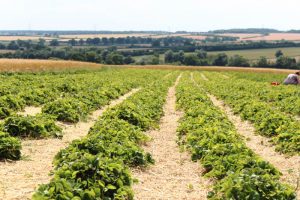
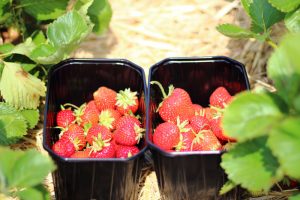
A few years ago, pick your own had a bit of a dip in popularity, but now it is definitely back in fashion and incredibly popular as a family day out. Susannah says that it takes people back to the old way of cooking; using seasonal vegetables when they’re available. Some people even visit the farm and pick buckets of fruit to be frozen and last them the entire summer.
Keeping the crops healthy is very important. Hill Farm PYO run on a 3 year crop rotation which helps maintain the soil and keep the fields producing the very best fruit and vegetables. As well as their crop rotation, Susannah and Paddy make sure that there is a daily inspection of the fields and that a different field is picked each day.
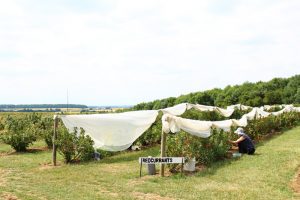
In addition to pick your own, Hill Farm also has a shop which sells a selection of pre-picked produce as well as local products, which is where we come in. Our full range of products is available on a beautiful stand behind the counter, and they tend to sell lots of our rapeseed oil later on in the year as it is perfect for when the squashes are in season. In fact, we have a brilliant recipe for squash season: http://farrington-oils.co.uk/recipe/chilli-chorizo-butternut-slice/ .
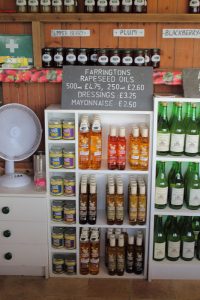
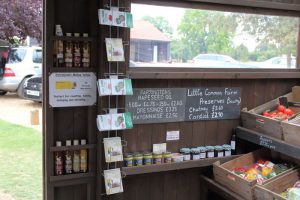
Hill Farm Pick Your Own is open from June to the end of October, so if you’re nearby it is definitely worth a visit this summer, just remember to call ahead to see what is available for picking each day. Website: www.hillfarmpyo.co.uk, phone number: 01733 233270.
Over the years I have tried to encourage the right sort of habitats on our farm for wild birds which either just visit Bottom Farm seasonally, or make it their home all year round. I am no bird expert, but I have been fortunate to learn from others in Agriculture, and wider afield, who have specialist knowledge on what to do to help our feathered friends.
One expert who lives locally is ornithologist and former Head of Conservation for the RSPB, Dr Mark Avery. Mark has visited the farm on many occasions, often early in the mornings, armed with binoculars, notebook and pencil to see what is around. Mark and I are both full of passion and opinions for our respective points of view, but we enjoy our conversations and I, for one, have learnt a lot from him on the bird life at Bottom Farm; what we have, what may be missing or in decline and what I can do to try to improve things. Two memorable occasions of excitement were firstly, when on Mark’s first visit, he was delighted to find nesting Lapwings in a spring planted field. I thought this was normal, but Mark said this was quite rare in our part of the country, so I had got off to a good start immediately. The second is the Turtle Doves, which would visit every year. Over the last couple of years, they have not been around, but I am pleased to report, one was spotted around the farmyard again last week, although I have yet to confirm this myself. This is now another rare occurrence in our part of Northamptonshire and I have caught the excitement off Mark to try and see them here, as a sign of our farming practises creating something that this rare species requires.
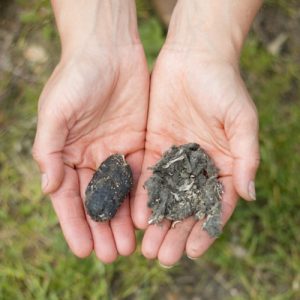
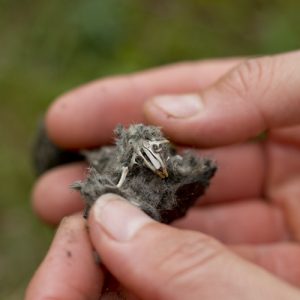
As well as trying to grow the right sort of habitats around the farm, we have built four owl boxes over the years. One of these is in constant use by barn owls, where I have heard young chicks active inside and occasionally seen adults fly out at sunset to fly gracefully over the fields on their evening hunting mission. The best sign of owls is the scattering of owl pellets on the ground. Owl pellets are not droppings as some people think at first inspection. Owls eat their prey whole, then re-gurgitate the indigestible fur and bones. For the more inquisitive and less squeamish, owl pellets are a fantastic record of what exactly they are eating, as well as being able to learn about the skeletal construction of small mammals.
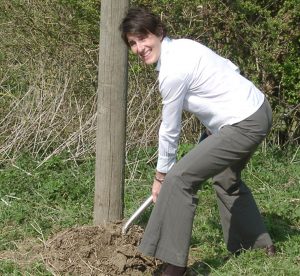

One of our owl boxes was officially opened by actress Tamsin Gregg, when we were launched as a LEAF Demonstration farm in April 2003. Tamsin was playing the part of farm manager Debbie Aldridge on Radio Four’s, The Archers. Since this, Tamsin has continued to have a fantastic career, winning a Laurence Olivier Award for Best Actress and starring in Black Books, Green Wing, Friday Night Dinner and Episodes, amongst others. We were delighted to host Tamsin and her family to our launch day, along with other guests.
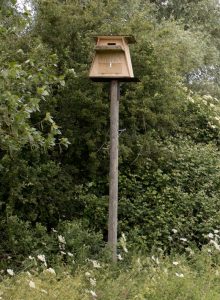
Anyway, over the intervening fourteen years, the owl box finally blew of its perch in a gust of wind. Over the winter months Marvin has been busy in the farm workshop making a new exclusive penthouse suite for any self-respecting owl and family that may like to make this their new home. This is now erected in its prime position and we will watch with interest to see who decides to inhabit it.

Do you love finding new local food producers, farm shops, restaurants and pubs? Well we do too, so we’re proud to now be part of Great Food Club. Great Food Club is an independent website that selects and recommends local food and drink independents. Based purely on merit, Great Food Club checks all its members before allowing them to be listed on the site. They use the simple criteria of ‘would we recommend this to our foodie friends?’ The great news is, they would happily recommend us!
One of our favourite things about the Great Food Club it’s perfect for finding great food in your local area. We’re incredibly proud of the fact that we are a Northamptonshire producer and so this guide is great for other Northamptonians to hear about us. By simply entering your post code, you can discover a world of fantastic foodie finds, right on your doorstep!
It is free to join the Great Food Club. Simply head over to www.greatfoodclub.co.uk and sign up. It is a fantastic way for foodies to find local producers, restaurants and shops in their local area. They will send you a membership card, which you can use in certain establishments to claim a discount.
You can find us on Great Food Club at http://www.greatfoodclub.co.uk/business/farringtons-oils/. If you love our products, which we hope you do, please feel free to leave a review and let everyone know!
Not only available in shops, we also sell our oil to various pubs, restaurants and cafes across the UK for use in their kitchens. Many of these businesses use our oil in interesting and innovative ways, and The Mermaid at Ellington is no exception!
The Mermaid can be found in the idyllic Cambridgeshire village of Ellington in a beautiful 14th Century public house. The name comes from the old ships timber used in its construction many years ago. The owner and head chef, Nick Marriott, is a Michelin star-trained chef who is passionate about bringing vibrant and refreshingly new ideas to a characteristic and historic country pub.

Having used our oil for a while, Nick recently contacted us with an idea. He wanted to use our rapeseed before it was pressed, and instead, germinate the seeds for an exciting new dish.
Here’s what Nick had to say about this innovative new way of using rapeseed:
“Here at The Mermaid at Ellington, Mellow Yellow Rapeseed Oil has fast become our go to quality oil of choice. With it being high in mono-unsaturated fat, it ensures us cooking at high temperatures without corrupting its lovely nutty character & flavour.
We now also use rapeseeds to bring to life our ‘Snail Garden.’ We germinate the rapeseeds and grow them into small sprouts by soaking the seeds and keeping them in a warm area to do their work. This process usually takes around 5 days but is definitely worth the wait. The germinated rapeseed add a beautiful image and perfect texture of a real life soil, as well as adding an earthy flavour to the dish. Combining the rapeseed with puffed wild rice & quinoa, caramelised chicory & sesame, the ideal soil is created for the garden. Hidden underneath sits a smoked garlic yoghurt and finished with salsify bark, baby vegetables and rosemary branches with flowers from the Mermaid garden.
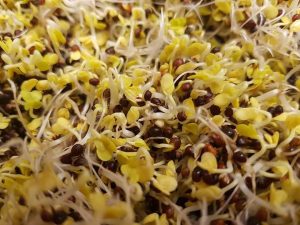
Mellow Yellow Rapeseed Oil is also a perfect option for dressings and creating flavoured oil in which we make a lemon grass & ginger oil for all our Asian style cooking. We very much recommend this high quality product.”
Thanks Nick!
For more information on The Mermaid at Ellington, head over to their website: http://www.themermaidellington.co.uk
Plant sterols – What are they? Where are they found? Duncan Farrington, founder of Farrington Oils, explains.
Many health-related issues are a direct result of poor diets, especially Coronary Heart Disease, which is a major killer in westernised populations. One of the biggest causes of Coronary Heart Disease is from high cholesterol. Raised cholesterol levels are partly genetic, but also partly a result of poor dietary choices. By eating a healthy balanced diet, over time you can bring your cholesterol levels back to your normal level.
In recent years, interest has increased in a particular natural food component that actively reduces cholesterol, called plant sterols. Plant sterols are fat-soluble compounds found in some vegetables, nuts and seeds, including rapeseed. They are similar in structure to cholesterol, which is found in animal fats such as meat and dairy. When eaten, plant sterols compete with cholesterol for absorption into the bloodstream. Your body finds it easier to absorb the plant sterols: they block the cholesterol from being absorbed, resulting in the cholesterol passing through and out of the body via the stool.
Plant sterols’ cholesterol-lowering effects have been known for some time. They are considered to be the most effective single food that can lower cholesterol as part of a healthy diet and lifestyle. Evidence suggests that eating between 1.5g and 2.4g of plant sterols each day can significantly reduce LDL cholesterol (‘bad’ cholesterol) by up to 10% (Heart UK).
These beneficial plant sterols are present in rapeseed oil. In fact, several vegetable oils contain plant sterols, with rapeseed oil being an excellent source, as shown in the table. Rapeseed oil has over double the sterol content of olive oil, and ten times that of coconut oil.
Total sterol content of crude vegetable oils.
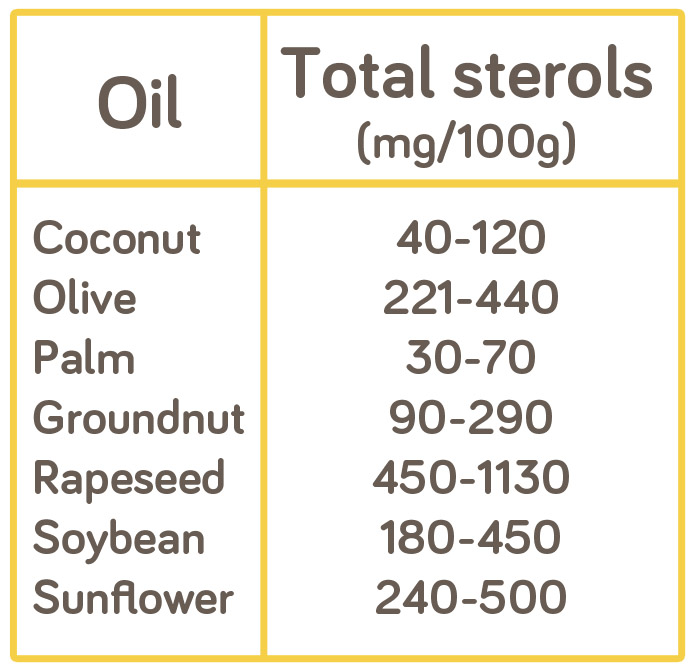
Adapted from Gunstone (2004) and Gunstone (2011).
As you can see, rapeseed oil contains the highest amount of plant sterols. This table is for crude oils, which means it is based on unrefined oils such as a cold pressed rapeseed oil. If we look at the refined versions of these oils, the plant sterol measurement decreases by up to 40%. This is caused by the bleaching and deodorising process. So, in order to consume more plant sterols from oils, an unrefined and cold pressed rapeseed oil, such as Farrington’s Mellow Yellow, is the best choice.
The knowledge of how effective plant sterols are in lowering cholesterol has led to the appearance of several successful food brands producing fortified foods, such as non-dairy spreads and yoghurt drinks with ‘added plant sterols’. The plant sterols added are actually those recovered from refined vegetable oils.
Although our rapeseed oil contains high amounts of plant sterols in comparison to other oils, I am not suggesting that Farrington’s Mellow Yellow alone will reduce cholesterol levels. To get your full 1.5g to 2.4g of plant sterols a day, you would need to drink around half a bottle of cold pressed rapeseed oil, which is obviously not realistic, nor how I suggest you enjoy our oil! However, by enjoying it alongside other plant sterol containing foods, as part of a healthy diet, you’ll increase your total plant sterol intake and be well on your way to reaching the ideal amount needed to reduce high cholesterol.
Duncan Farrington
For more information on this topic, see:
Gunstone F D., (2004). Rapeseed and Canola Oil; Productrion, Processing, Properties and Uses Blackwell Publishing
Gunstone F D., (2011). Vegetable Oils in Food Technology Composition, Properties and Uses Wiley-Blackwell p253-254.
Heart UK. https://heartuk.org.uk
Autumn Planting is Completed, with the last of the wheat being drilled into wetter soils than I would like, but on the whole a pretty good season. Well done to Marvin who has been chief drill man this year. Now the anxious wait and watch as the wheat emerges, to see if there are any embarrassing misses or wobbly bits in fields, providing neighbours with the chance for friendly ribbing and entertainment. – I’m sure Marvin will be fine and everything will look spot on.
I have had a couple of days on the drill this year, including one field where I have missed patches. Hopefully, there will be eleven equally spaced bare patches across the field, each around 4 by 6 metres in size. These are skylark scrapes, which are designed to allow skylarks to land and take off safely, as well as to have dust baths and sun bathe. Being scattered in the field, they allow skylarks to nest under the safety of cover from the adjacent crop growing around them; thus reducing the risk of predation of these endangered ground-nesting birds by foxes, buzzards or kites for example. This a brilliant example of one of the sustainable farming practices carried out by LEAF farmers www.leafuk.org
We have had the excitement of a new tractor arriving this month. The British built New Holland replaces our thirteen-year-old John Deere, after 5600 hours of reliable service. This is equivalent to a car travelling at around 45 miles per hour doing over a quarter of a million miles, but remember it is in muddy, bumpy fields, often carrying or pulling heavy loads. As well as a tractor, it also had a loading shovel on the front, used to load lorries with the crops after harvest. The loading shovel was 21 years old and I reckon has loaded over 50,000 tonnes of crops, hardcore, and other materials over its life. That is equivalent to 35 million bottles worth of Farrington’s Mellow Yellow!
The new tractor certainly has a lot to live up to. I chose it because the engine is superior, using the latest emissions technology, making it very frugal and clean. It has all the usual toys and buttons, from cab suspension, tiptronic gear box, air conditioning to blue tooth radio. However, because it is blue rather than our usual green, the girls in the office are not so convinced it matches our other two tractors. However at three times the cost of an average family car, I won’t be adding to it anytime soon. Besides, Marvin will be getting a complimentary pair of overalls to match it.
Just before Christmas, we found a poorly and weak looking owl sitting in a field. Damian collected it up, put it in his lunch box and bought it back to the farm. I contacted our electrical engineer Peter, who by day looks after local companies’ machines, and when not working is a registered rehabilitation keeper of birds of prey. Peter has been looking after injured birds of prey and other wildlife for many years. He takes birds from the RSPB, local vets and others, purely on a voluntary basis, for the love of rehabilitating wild animals. Now the owl flies again.
I took the owl to Peter, which we had identified as a male Long Eared Owl (Asio otus). These are a medium sized nocturnal and secretive owl. They are rare in the UK with between 1,500 and 4,700 pairs. They are also extremely beautiful with the easily recognised long tufts of head feathers looking like ears (but not), and deep orange eyes.
Ollie, as he was named, had been run over by a vehicle, suffered a broken pelvis, lost the use of his legs, as well as some of his tail feathers, and had just about given up the will to live. He was given the correct medicines, and hand fed for the first week. After a few weeks he was back to full health, and ready to return to the wild.
One evening at dusk we took him back the field and released him. He flew off into a nearby hedge, had a little look around, before flying off into the increasing darkness. I haven’t seen any sign of him since, which is apparently a good sign. Well done Peter, another success story and happy patient.
We are very excited about Jamie Oliver’s newest restaurant, Union Jacks which opened earlier this month at Central St Giles Piazza in London’s West End. Jamie has got together with award-winning American chef, Chris Bianco, to create a new concept where ‘wood-fired flatbreads meet great British flavours’.
One of those great British flavours is Farrington’s MELLOW YELLOW cold pressed rapeseed oil, which is being drizzled over the new flatbreads. Chefs at Union Jacks are enthusiastic about MELLOW YELLOW as it is not only British and tastes delicious but is also performing so well.
Nearly all of the ingredients for the toppings are unabashedly local and celebrate the wonderful growers, farmers and winemakers we have in this country. With enticing combinations such as roast shoulder of old spot pork, quince & Bramley sauce with Cropwell Bishop Stilton, crackling & watercress, we think Jamie is on to a winner.
A new site for a second Union Jacks has already been announced on Cheswick High Street.

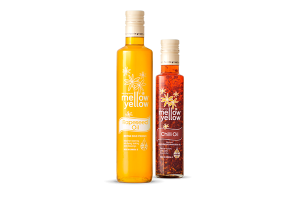 Oils
Oils Rapeseed Oil
Rapeseed Oil Chili Oil
Chili Oil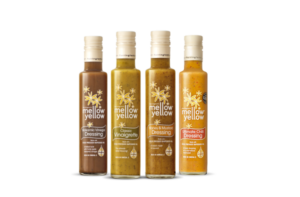 Dressings
Dressings Classic Vinaigrette
Classic Vinaigrette Balsamic Dressing
Balsamic Dressing Honey & Mustard
Honey & Mustard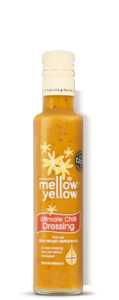 Ultimate Chilli Dressing
Ultimate Chilli Dressing